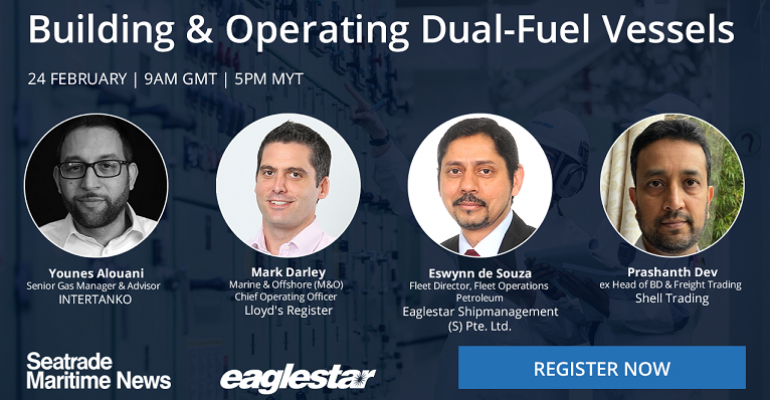Issues around dual-fuel operations will be discussed in-depth at a forthcoming webinar entitled “Building and Operating Dual-Fuel Vessels” presented by Seatrade Maritime News, and hosted by Eaglestar.
At present, dual-fuel vessels in operation run mainly on LNG and VLSFO. Fewerrun on ethane, LPG and methanol, fuels which are similar with the cargo they carry, respectively. As shipping explores new alternative fuels, the ability of tanker owners to use different other liquid fuels was highlighted by Younes Alouani, Senior Gas Manager & Advisor, INTERTANKO, who will be a panellist on the webinar.
He notes that while shipping companies are not technology designers or alternative fuel manufacturers, they will play an important role and contribute to operating and testing technologies and new fuels.
“The tanker segment was always a step ahead in testing new technologies and new fuels for the simple reason that before the deployment of the alternative fuels supply chain, a new technology needs to prove concept and reach maturity before scaling up,” Alouani explains.
“Tankers offer an initial answer to the egg and chicken conundrum by using cargo(es) as alternative fuels. LNG carriers were first in line, and now we see ethane carriers, methanol carriers, LPG carriers and soon ammonia carriers using cargo as fuel.”
This point is underscored by the experience of Eaglestar, part of the MISC Group.
Webinar participant, Eswynn de Souza, Fleet Director, Fleet Operations Petroleum Eaglestar Shipmanagement (S) Pte. Ltd, explains: “Staff were given basic training in our marine academy ALAM, and then sent onboard the existing LNG vessels for a few weeks of hands-on training in LNG loading & discharge operations which has prepared them well for operating dual-fuel vessels. This is certified basis the IGF code.”
Looking at how this experience can be transferred alternative fuels under development such as ammonia and hydrogen, de Souza says: “Experience in dual-fuels does give advantage to operating alternative fuel types however the technology is still in its infancy.”
Many options remain in terms which fuels will be used in the future. “Nonetheless, we are working together with a number of key parties in the maritime sector on the CASTOR initiative which is to jointly develop commercially viable deep-sea Zero Emission Vessels by 2030,” he says.
“Additionally, as a believer in LNG as a longer-term solution in maritime decarbonisation, within the group we have been looking for technologies to reduce the methane slip and improve the ‘tank to wake’ decarbonisation environment.”
Find out more about the webinar
While fuels are a major focus in the discussions on decarbonising shipping they are not the only element with improving vessel efficiency through smart shipping and optimisation is another important way in which to reduce the environmental footprint from the industry.
Panelist on the webinar, Mark Darley, Lloyd’s Register (LR) Marine & Offshore Director, comments: “Environmentally sustainable shipping is about more than just steel and fuel.
“It is not guaranteed that shipping will have access to the energy that it needs to continue to operate in the same way it does today and be zero-GHG emitting.”
Do this the shipping industry needs to maximise its utililisation and minimize its energy demand.
“This organisational element is where smart shipping has a role to play. A maritime energy transition will need smart shipping technologies which support more advanced operating models with tighter constraints and tolerances,” Darley explains.
“LR playing our part here with Digital Class, digital maintenance and reliability, and operational optimisation through our i4 Insight Platform and Greensteam acquisitions.”
Register now for the Building and Operating Dual-Fuel Vessels Webinar
Copyright © 2024. All rights reserved. Seatrade, a trading name of Informa Markets (UK) Limited.
Add Seatrade Maritime News to your Google News feed.  |

